The EU's curious choice of Juncker for president
- Published
- comments
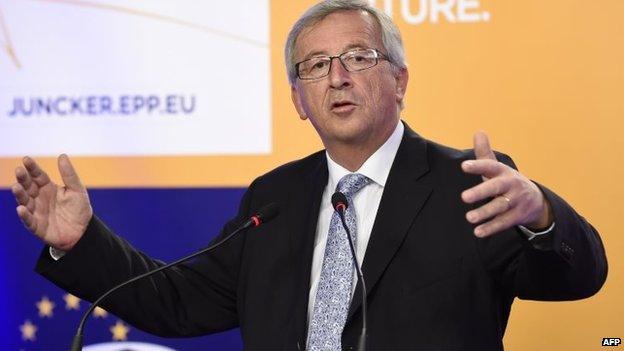
Mr Juncker says he is open to listening to British concerns
It will be a curious nomination. Almost certainly this week the EU's heads of government will nominate the centre-right politician Jean-Claude Juncker to be the most powerful official in the EU.
Why curious? Because very few officials or heads of government believe he is the best man to lead the EU at a moment of growing disenchantment with the European project.
He is the classic Brussels insider, with an encyclopaedic knowledge of Europe's rules; a man who prefers the secret, early-hours deal-making to the role of open persuader; a man deeply committed to further European integration.
So a typical conversation - which I have had many times over the past week - goes like this: "Do you think Mr Juncker is the right face for the EU at this time?"
Answer: "We're not interested in faces or personalities, it is the agenda that counts." So the question is neatly side-stepped.
Private misgivings
It is very difficult to find anyone who can explain why Mr Juncker is the best candidate to lead the EU in a fresh direction.
From various conversations it seems that several heads of government are likely to back him at a summit later this week while not believing in him.
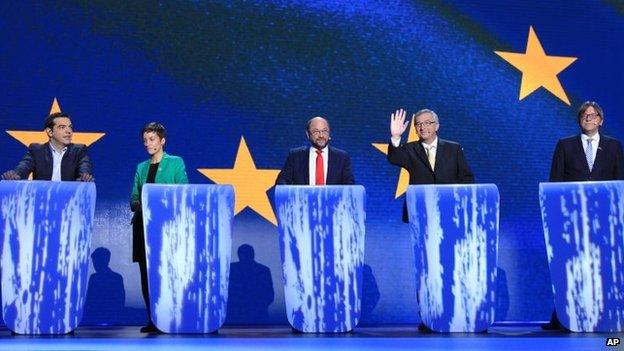
Mr Juncker (second from right) was the lead candidate of the centre-right European People's Party grouping
In Brussels, Downing Street is judged to have made miscalculations but part of the reason behind David Cameron's stubborn opposition to Jean-Claude Juncker is his frustration with the difference between what some other leaders have expressed to him in private and their public statements.
The German Chancellor Angela Merkel is a doubter herself. In the immediate aftermath of the European elections she suggested a "broad tableau" of candidates should be considered.
It was only later after scorching criticism in the German press that she had told voters that their vote would determine the next Commission President that she firmly lined up for Mr Juncker. As I have said in a previous blog, German commentators urged her to choose between Britain and democracy.
A further curiosity is Mr Juncker's own commitment to this high-profile post.
Some of those close to him describe "a wobble" when he appeared to doubt his desire for the EU Presidency before digging in, apparently affronted at the criticism.
So how does one explain why so many leaders - including doubters - are lining up behind him?
Firstly, he was the centre-right's candidate.
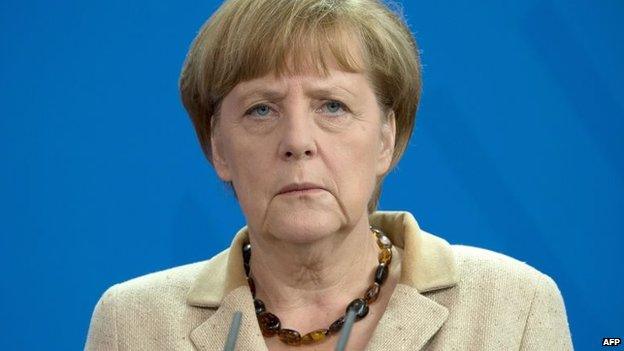
Angela Merkel was criticised in the German press when she did not express support for Mr Juncker
Many conservative leaders genuinely believe it would be a denial of democracy to have sold him to the electorate and then to drop him. It has little to do with Mr Juncker.
"You can't run a campaign with TV debates and act as if it never happened," said one minister.
Even so there are misgivings. Amongst some of those who campaigned for Parliament's candidates to lead the Commission there are admissions the process was flawed.
They shy away from answering the question "how many people do you think actually cast their votes with Mr Juncker in mind?"
The 'Italian approach'
On the centre-left there are two reasons for falling in behind Mr Juncker.
Firstly, politicians like Martin Schulz (who was the candidate of the Socialists) see this as part of a wider struggle to boost the influence of the European Parliament.
If Juncker becomes President of the EU Commission it will represent a power shift away from national governments.
Secondly, there is what I might call the Italian approach. And that is to bargain. To trade support for concessions.
The Italians have been smart; their priority is winning flexibility over budget rules and targets for reducing the deficit.
They want the next five years to be about growth rather than continuing austerity. They believe they have already got support for a more flexible interpretation of the rules.
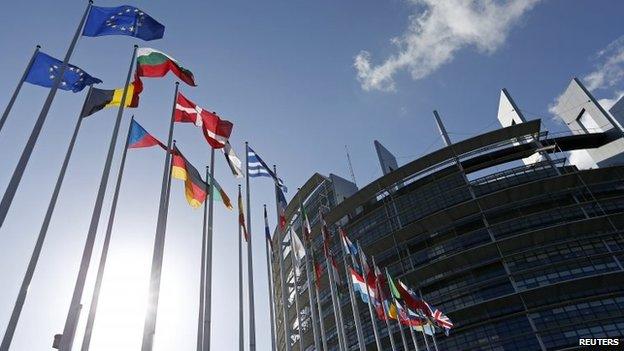
Mr Juncker's supporters want to boost the influence of the European Parliament
Their strategy appears to be to back Mr Juncker now before the start of the Italian Presidency in July. With the top job settled they believe they will be more able to bang the drum for measures to promote growth and jobs.
Now there are many Brussels voices who argue that David Cameron should have played a similar game: don't focus on the man but try and bind him to a reform agenda. That is what Angela Merkel has been telling the British prime minister.
In London there are deep-seated doubts about what kind of reforms Mr Juncker might back.
Before the election in May he answered some of my questions. He said "I am open to listening to British concerns... I am ready to engage in a dialogue with David Cameron to negotiate a fair deal with Britain."
He also said: "Ever closer union can mean different things for different states."
But the detail is elusive and those close to him are briefing that he would be resistant to weakening the current rules on freedom of movement.
'Back-room deal'
It is often said in Brussels that David Cameron has made misjudgements.
Clearly Angela Merkel did not like the hint of a threat that the election of Mr Juncker would make it harder to keep Britain in the EU.
It did not help that the Conservatives' parliamentary group accepted MEPs from the German euro-sceptic party.
But when Downing Street warns of "handing power to the European Parliament through a back-room deal" it taps into a concern shared by a number of countries.
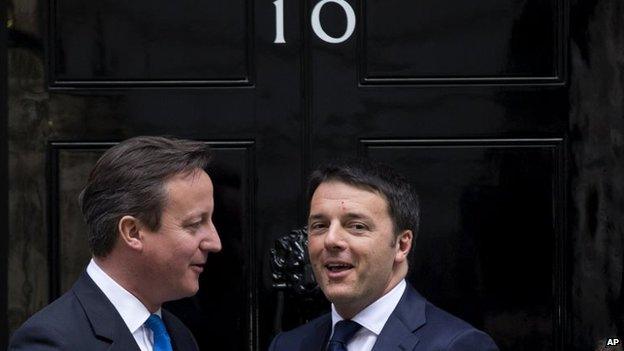
Some argue that David Cameron (left) should have taken an approach similar to Italian Prime Minister Matteo Renzi's
In the end politics in Europe is rooted in compromise. It is how Brussels works.
Whatever their private misgivings very few leaders are prepared to risk an institutional showdown with the European Parliament which has to vote on their nomination.
David Cameron wants to put the other leaders on the spot by insisting on a vote and so putting on the record why they support Jean-Claude Juncker in Europe's hour of need.
The heads of government later this week will have to decide on one man. No other names are on the table.
In the end Mr Juncker's likely victory is not because he is seen as the outstanding candidate to take Europe forward but because he helps forge a consensus.